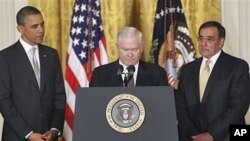U.S. President Barack Obama on Thursday announced a major shakeup of his national security team. Analysts say the move comes during a critical period in the U.S. war in Afghanistan.
The president said he is nominating CIA Director Leon Panetta as the next defense secretary and Army General David Petraeus to succeed Panetta as CIA chief.
Anthony Cordesman, a military and intelligence analyst at the Center for Strategic and International Studies, said the personnel changes come during a particularly complicated moment in Washington. "At a time of extreme partisan bitterness, growing debate over the Afghan war and what is going to be a self-seeking jockeying for political advantage over every aspect of the federal budget, which is going to last at least through 2012."
Panetta will take over at the Pentagon from Defense Secretary Robert Gates, who is expected to retire in June, and has received generally positive reviews for his management of the CIA.
Rick Nelson is a retired U.S. Navy helicopter pilot with more than 20 years experience in military operations, including assignments at the National Security Council and the National Counterterrorism Center.
He said Panetta is a good choice to lead the Department of Defense, which is facing budget cuts and a drawdown of troops in Iraq and Afghanistan. "He was able to go into the CIA at a very critical time, as an outsider, win over the workforce there and lead the CIA back into pretty positive territory. I think that says a lot about him as a leader, as a manager, particularly as someone who can operate inside the Washington, D.C. bureaucracy. So going over to the Pentagon, he is going to be able to play those skills further."
With the CIA and Defense Department appointments, senior Obama administration officials say the president wants to continue current policies.
General Petraeus is not expected to leave his post as commander of NATO and head of U.S. forces in Afghanistan until he implements the first phase of President Obama’s expected gradual withdrawal of forces, set to begin in July.
Petraeus is expected to retire from the Army before becoming director at the CIA.
As CIA director, Panetta has supervised a sharp increase in the agency’s bombing campaign in Pakistan. U.S. officials have never publicly acknowledged the use of drone airstrikes in Pakistan, but privately they have confirmed their existence to various news outlets.
Petraeus has used Special Operations troops to conduct secret intelligence missions in Afghanistan.
John McLaughlin served at the CIA for three decades and is a former acting director of the agency. He said the Petraeus appointment comes at a time of increasing cooperation between the CIA and the Pentagon.
"I think it is a good appointment. I think the CIA will find General Petraeus very compatible with the agency culture. His background is interesting. Most people do not realize he has a Ph.D., for example. He is a soldier-scholar. So he is well prepared to be comfortable on both the operational and the analytic sides of the CIA," said McLaughlin.
The president is nominating Ryan Crocker, a former ambassador to Pakistan and Iraq, to replace Karl Eikenberry as ambassador to Afghanistan.
Lieutenant General John Allen, the deputy chief of Central Command, will replace Petraeus as commander of U.S. and international military forces.
Cordesman points out these changes come at a critical time of transition in Afghanistan.
"So virtually all of the U.S. country team is going to be changing at the top as we go into one of the most critical [military] campaign seasons and at a time when it is obvious that American support for the war is steadily diminishing," said Cordesman.
Obama's nominations all require confirmation by the U.S. Senate.




